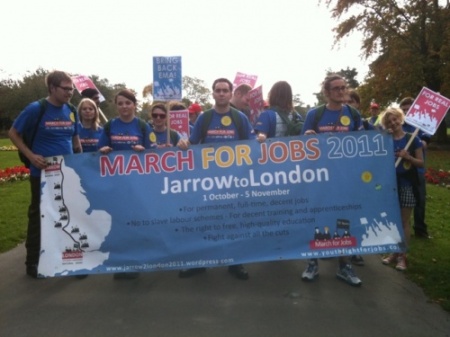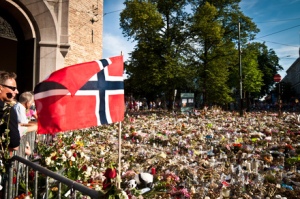The branch has launched a new website:
http://www.socialistportsmouth.co.uk
As well as regular posts we’ll be hosting debates, podcasts and we’ll be launching a new forum so you can join the debate.
The branch has launched a new website:
http://www.socialistportsmouth.co.uk
As well as regular posts we’ll be hosting debates, podcasts and we’ll be launching a new forum so you can join the debate.
 Austerity is not working! That was the message delivered to Portsmouth city council on Tuesday when 100 anti-cuts activists lobbied the annual budget setting meeting, before presenting a Needs Budget as an alternative to a second wave of cuts.
Austerity is not working! That was the message delivered to Portsmouth city council on Tuesday when 100 anti-cuts activists lobbied the annual budget setting meeting, before presenting a Needs Budget as an alternative to a second wave of cuts.
The lobby was organised by Portsmouth Against Cuts Together (PACT), a community group supported by the city’s trades council. PACT brings socialists, trade unionists and community campaigners together to oppose all cuts to jobs and public services.
PACT first presented a Needs Budget in 2011 when the council voted for the first wave of cuts. This year the Lb Dem run council proposed a further £20 million worth of austerity with an intention to cut up to £45 million over three years.
Speaking at the deputation on behalf of PACT, Socialist Party member Ben Norman said: “It is clear austerity is not working. It is a failed strategy, born of a failed ideology and by continuing with it you are failing your communities.”
Deputations were also made by UNISON, to oppose the planned 250 redundancies to local council workers and by the Portsmouth Pensioner’s Association who argued that the cuts are having a disproportionate impact on those who most need support.
PACT called on the council to oppose all cuts, to reverse decades of privatisation and to reject the council tax grant from central government which will result in even more cuts in 2013.
As an alternative to austerity PACT called for a budget to meet the needs of the city, not the ideology of central government. This included investment in homes, creating climate jobs and reinstating the Education Maintenance Allowance (EMA).
Through its ownership of a commercial port the council is asset rich and has one of the largest reserve funds in the country. PACT called for these funds to be used to delay cuts while the council worked with unions, community groups and neighbouring councils to campaign for funding from central government.
As neither Labour nor the Tories, considered the official opposition, proposed an alternative budget it is clear that the unions and community groups are now the real opposition to austerity.
To continue to build this opposition PACT will be hosting it’s AGM on March 5th, 7.30pm and Southsea Community Centre.
 Anti-cuts campaigners in Portsmouth and Southampton will present alternative ‘needs budgets’ to their respective city councils on Tuesday as councillors vote on the latest wave of cuts to public services.
Anti-cuts campaigners in Portsmouth and Southampton will present alternative ‘needs budgets’ to their respective city councils on Tuesday as councillors vote on the latest wave of cuts to public services.
The campaign groups, Portsmouth Against Cuts Together (PACT) and the Southampton Anti-Cuts Union, present an alternative to austerity, allowing councils to refuse to pass down cuts to the community. The budgets also present a strategy of economic recovery including the reinstatement of the Education Maintenance Allowance (EMA) and sustainable job creation projects.
In Portsmouth public sector workers, unions and anti-cuts campaigners will lobby the council at 1:00pm on February 14th 2012, before making a deputation to the council meeting to present their budget. In Southampton campaigners will lobby the city council at 1pm on the 15th February.
Titled Austerity Is Not Working the alternative strategy follows on from the budget presented by PACT to the council in 2011, when campaigners warned of the inevitable results of austerity.
“In the past year unemployment has risen, and young people have been forced out of education. It is clear that austerity is not working,” said Jon Woods, convenor of PACT. “If the council vote to carry out further cuts 250 council workers could lose their jobs while over £20 million will be cut from vital public services.”
PACT call on councillors to:
“Budget day in Southampton makes for grim reading as all parties line up to support cuts while council tax bills remain sky high. Anti-cuts campaigns will continue to point to banker’s bonuses, multi-billion pound tax evasion and corporate profits as a source of finance to protect jobs and services. We stand in solidarity with council workers and campaigners fighting the cuts nationwide against the austerity agenda,” said Gavin Marsh from Southampton Anti-Cuts Union.
See footage from last years lobby:
By a Junior Doctor and Socialist Party Member:
As the fight for public sector pensions intensifies the need for greater unity and resistance is crucial. The message from the ConDems is clear in their final offer for public sector pensions – work longer, pay more, get less. Anger is growing amongst health workers already hit by pay freezes, job losses and an increasingly overstretched NHS.
This was reflected at a meeting called by the BMA (British Medical Association) in Portsmouth this week. There was unanimity amongst the 160 doctors there to call for industrial action short of strike in the BMA’s current consultative survey of members due to close next week. This was up from a third of doctors supporting industrial action short of strike in a similar meeting in the build up to November 30th strike. This fight is not just about pensions.
With companies such as the American consutancy firm McKinsey poised to take over profitable NHS services the ConDems are desperate to slash NHS worker’s terms and conditions to make them more attractive for takeover. This is despite the fact that the NHS pension scheme is set to deliver over £10 billion to the treasury in the next four years. It is key that the BMA works closely with members of other health care unions to build a co-ordinated campaign to fight NHS cuts and privatisation.
 From the moment the first of NATOs bombs fell and his murderous advance on Benghazi was ground into the sand it was always going to end this way for Gadaffi. The grainy mobile phone images showed us an old man being dragged through the streets, before being beaten and murdered. The same treatment many Libyans no doubt received from the Colonel’s own police over the past 42 years. There is no need to mourn a tyrant; he stood against everything that we purport to stand for. The only question is what’s next?
From the moment the first of NATOs bombs fell and his murderous advance on Benghazi was ground into the sand it was always going to end this way for Gadaffi. The grainy mobile phone images showed us an old man being dragged through the streets, before being beaten and murdered. The same treatment many Libyans no doubt received from the Colonel’s own police over the past 42 years. There is no need to mourn a tyrant; he stood against everything that we purport to stand for. The only question is what’s next?
Far away from the bloodshed of the Maghreb the British left have been as fragmented and contradictory as ever as the Arab Spring turned to Libyan Civil War and NATO bombardment. While the Socialist Party maintained the anti-imperialist and anti-Gaddaffi positions consistent with a demand for socialism in Libya, some elements of the Stop the War movement veered dangerously close to supporting Gaddafi, viewing events as they do through the prism of ‘Anyone but America.’ Others went in the other direction, offering NATO support that it neither noticed nor needed.
As an aside the harsh reality of the Libyan conflict for the British left is that until we are in a position to directly influence events, either by stopping the British contribution to the war through industrial militancy or intervening in Libya through International Brigades, the positions we take matter very little to the people actually doing the fighting. Where they do matter however is with the people we actually meet. The very minimum a socialist must do to qualify as such is to actually advocate socialism, so our task is to explain the Arab revolutions, within the context of the global financial crisis, and to use Libya as an example of the need for a socialist alternative, in this case to NATO and the National Transitional Council. Anything else is either pointless, removed from reality or a dereliction of duty.
Counter-historical questions about the potential massacre in Benghazi no longer matter. It is impossible to say what would have happened if NATO had not intervened. Civilians may have been massacred, or else the rebels may have defeated an overstretched army whose loyalty to Gadaffi was limited at best. Instead of focusing on what may have been we can only analyse what is: Gadaffi is dead, the NTC will declare national liberation within hours, NATO aircraft carriers will withdraw and the oilmen will move in. Further afield Tunisia remains rocked by protests, Egypt is under military dictatorship and Assad is committing war on the people of Syria. These are dark days for the Arab revolutions.
The question, which only someone on the ground can answer, is how far are the Libyan people willing to take their revolution? They are armed and they are on the battlefield, yet now that Gadaffi is dead and the civil war is effectively over the leaders of the NTC wish nothing more than for the fighters to return home, hand in their weapons and get back to living under the same material conditions as before. If they do so the Gadaffi posters will be torn down and they may even get the first vote in a generation, but the oil money will remain in the hands of the elite as Gadaffi’s Libya is rebranded Libya PLC.
An alternative may be the rise of Islamism. Perhaps after a short time disillusion with the NTC will set in and the fighters who came from Afghanistan, Saudi Arabia and Somalia will help turn Libya into another Gaza strip, a mini-Tehran or a Mediterranean Somalia. Perhaps those western aircraft carriers shouldn’t leave too quickly.
Of course we know that there is another alternative, that if the people of Libya have learnt the lessons of history they can play a fundamental role in its latest chapter. By continuing the revolution, by taking it out of the hands of NATO and the NTC leadership, the working class can not only take power in Libya, they could give new direction to the revolutions of Tunisia, Egypt, Syria and even the protest movements of Israel and Palestine.
What is lacking in Libya after 42 years of dictatorship is an active revolutionary party to promote the ideas of Socialism and give genuine leadership to the movement. Also, the fact that Gadaffi at times referred to his own regime as ‘socialist’ serves only to confuse, yet both of these challenges can be overcome. While a revolutionary party is vital to achieving socialism it is possible that the road towards socialism can be taken by those who do not yet realise their destination. Just as you do not need to be physicist to live under the rules of Newton, nether must you be a Marxist to be subject to the societal rules that Marx first understood.
First, time must be given to re-build, or even build from scratch, a genuine labour movement. Socialists would support calls for independent free and fair elections, with the creation of left wing parties, while using the time to build independent trade unions and worker’s organisations.
Going into, during and after these elections revoluionaries must call for a programme to outline a social revolution to transform Libya, including taking the oil fields into public ownership, ensuring that the benefits are handed over to the people. The idea must once again be raised and popularised that it is class which must become the driving force of the Arab spring, not tribal loyalty, religious fervour or national identity.
The prospects for the emergance of a form of socialism out of the rubble of sirte and tripoli may be extremely mixed, while the chances of a text book revolution and a straight line to socialism are as remote as they ever can or will be, but it remains possible. It was the fruit sellers of Tunisa, the textile workers of Eqypt and the oil workers of Libya which began this revolution, and the task can only fall to them to finish it.
 Today marked the day 1 of the Youth Fight for Jobs Jarrow March, a campaign which follows in the footsteps of the famous 1936 crusade for jobs by Jarrow dockworkers.
Today marked the day 1 of the Youth Fight for Jobs Jarrow March, a campaign which follows in the footsteps of the famous 1936 crusade for jobs by Jarrow dockworkers.
Below is the post from the official march blog, read the rest and follow the marchers progress here: http://jarrowmarch11.com/
October 1st 2011: Hundreds of people rallied and marched through Jarrow today ahead of setting off to London. Representatives from the PCS & RMT unions joined the marchers and spoke in support of the campaign against youth unemployment. Kevin Maguire of the Daily Mirror addressed the rally alongside Lizi Gray whose great-grandfather was on the original 1936 march. The march set off with the RMTs brass band and received fantastic support from local people as it passed.
 We’re proud to annouce the launch of our sister branch, the Gosport Socialist Party.
We’re proud to annouce the launch of our sister branch, the Gosport Socialist Party.
The branch is organised by branch secretary John Hustler who can be contacted via: gosportsocialistparty@hotmail.co.uk
Website: http://gosportsocialistparty.org/socialist_party_website_002.htm
 ‘All the hallmarks of an Al-Queda attack.’ So claimed the talking heads across most of the major 24-hour news stations as reports began to seep in of the Oslo bombing. By the time it became clear that the bombing was a feint to distract from an unfolding massacre at a youth camp the line shifted. We were witnessing a ‘repeat of Mumbai.’
‘All the hallmarks of an Al-Queda attack.’ So claimed the talking heads across most of the major 24-hour news stations as reports began to seep in of the Oslo bombing. By the time it became clear that the bombing was a feint to distract from an unfolding massacre at a youth camp the line shifted. We were witnessing a ‘repeat of Mumbai.’
Except we were not. On that day terrorism had a Norwegian face and the cause of Anders Behring Breivik was not one of jihad. He didn’t fight for Sharia law, for a global caliphate or in solidarity with the Taliban. There wasn’t even a spurious link to Palestine. Instead Breivik carefully murdered over 70 teenagers in the name of fervent nationalism and plain old xenophobia, albeit dressed in the tired guise of a ‘clash of civilization.’ A clash which stubbornly fails to materialise despite the very best efforts of many over the past 10 years.
Breivik has clearly failed to kick-start the Europe wide war against multiculturalism which he supposedly yearns for in his rambling ‘manifesto.’ Instead his five minutes of infamy have given commentators the world over the opportunity to link his crime to whichever agenda they happen to already be pushing.
To the right-wing media Breivik was reacting to the ‘legitimate’ problems of immigration and the failure of multiculturalism. They didn’t plant the bombs themselves, we are told, but the Muslims should still shoulder the blame. Ex-Fox News fear-peddler Glen Beck even managed to refer to the youth camp as being reminiscent of the ‘Hitler Youth’, to suit his favored: ‘Europe is socialist and so were the Nazis’ canard.
Of course the liberal-left and the hard-left did the same. To us Breivik is merely a symptom of the crisis in Europe. He shows what happens in the world of recession when people are alienated from politics, and groups like the True Finns have a chance of reaching government on a ‘We shouldn’t pay for Greece’s crisis’ ticket of isolationism. To us, they didn’t plant the bombs themselves but ultimately the bankers should shoulder the blame. To some, the usual suspects, Breivik also demonstrated how the spectre of the Far-Right stalks Europe and how groups such as the EDL may be prepared to commit similar acts in London or Bradford.
Aside from both narratives London Mayor Boris Johnson plowed his own furrow by calmly declaring Breivik a madman, driven by his own rejections and pathetic existence.
The ‘lone madman’ accusation is of course part of a traditional centre-right view of crime in general. In a magistrates court the accused didn’t shoplift because of ‘society’ but because they are a lone criminal, and people like Breivik do not commit murder because of social reasons, they do so because they possess a deviancy which places them firmly in the camp of the insane. He cannot be reasoned with. He can have no cause we could ever comprehend. He’s just a babbling madman with access to firearms.
Of course the ‘clinically damaged psychopath’ label can fairly be applied to some. You can after all suffer from a broken mind just as easily as a broken leg. However, focusing on the individual and not the context is usually a certain way of neither understanding nor preventing similar crimes in the future.
The reality of Breivik will of course not conveniently fit into anyone’s narrative. It’s quite possible he will be found mad, but the inescapable truth will be that he is a product of his society. This is an age where mainstream political parties are being widely rejected and without an attractive alternative the result can easily be further alienation or apathy just as it can lead to the indignado camps of Madrid and Athens.
At the same time the far-right are looking to exploit people’s misery to further their own political ends. Indeed the intrinsic ability of capitalism to divide us along racial, ethnic, religious and national lines, thereby pitting working family against working family will always aid them in this task.
However, even if all of these points and possible motives contain a nub of truth, and even if Breivik is a product of his times and his society, there is one simple fact. No one else has done what he did. Even the far-right, who will certainly agree with his principles, are not in a position to emulate his actions. He may be a symptom of crisis, or even a symbol or some ideas, but he alone was prepared to turn them into action, which means we should also consider the individual.
Little is known about Breivik’s life. It is suggested he was reclusive, unpopular in school and unsuccessful with women, but all that is speculation. What we can say is that he perceived himself to be on the periphery of society and in his mind his selection of targets showed he was targeting its centre, the establishment.
On an individual level he felt that he lived on the very edges of society and in retaliation he sought to identify himself with a violent ideology which he could use to explain his alienation and battle against it. It’s a true chicken and egg question. Did he hate before he became affiliated to the far-right, or are we to suppose to believe he was a ‘normal’ and contented citizen before coming into contact with a poisonous ideology and taking its worst tenets to their logical conclusion?
This process of the alienated and marginalised identifying themselves with causes which are also on the edges of society is not new and to the hard left it should be more than familiar. Since the defeats of the 1980’s socialism, in the hard-left sense of the term, has been increasingly pushed to the social fringe. While the far-left has busied itself and has fervently fought tooth and nail to reverse the slide into obscurity and political oblivion the harsh fact remains that most far-left parties worthy of the term would struggle to fill an average football stadium with its official membership. Indeed most would fail to fill a single stand at Fratton Park.
Inevitably when an ideology, or indeed a political party, is pushed from the mainstream towards the periphery it will begin to attract people who have already been pushed there themselves. For the Scandinavian far-right, who have been pushed back to the frayed edges of public acceptability over many decades, they find themselves standing alongside Anders Behring Breivik. Breivik may be unique, or certainly very rare, in having the will to take his adopted ideology to such a criminal conclusion, but perhaps in that there is an uncomfortable point. His motivation may not have been far-right politics itself. That may have merely been his excuse.
This is not to say however that hidden amongst the huddled and sparsely filled ranks of even the far-lefts furthest reaches, CPGB-ML, Workers Power, Class War, the AWL, you will find the left’s Breivik, but what it does mean is that those who feel marginalised by society will make up a disproportionate amount of any left party’s membership as long as they remain on the periphery.
To say it is not a new problem implies unfairly that it is a problem at all, but as a political reality it is hardly new. In Road to Wigan Pier George Orwell famously declared that like Christianity the worst advertisement for socialism are its adherents as he pointed to the makeup of the Independent Labour Party from viewpoint of the mainstream middle classes. To Orwell the ‘odd’ who made up the ILP were ‘vegetarians’ and ‘pacifists’, a viewpoint which says more about 1930’s perceptions of deviance than it does of the manifesto of the ILP.
Social norms move on and while vegetarianism is no longer considered (that) weird the left, and the far left, have remained a home to all those pushed to the far reaches of society’s spectrum, a tendency which has reached its nadir in recent decades. From the latter half of the 20th century to present day it is no coincidence that the far-left has thrown itself at the causes of rights for homosexuals, ethnic groups or the disabled as comrades from those constituencies have found a political home and an ideology for liberation.
Today of course many of those causes have been normalised, yet what remains of the far-left remains a cacophony of the marginalised and the proudly odd. You’re just as likely to find someone who declares himself to be ‘vaguely Buddhist,’ a nature worshiping pagans or, yes, a vegetarian, as you are a trade union steward or shop floor militant. (Not that any of these characteristics are mutually exclusive of course.)
It goes beyond breaching political correctness into outright rudeness and perhaps even mild bigotry to consider this annoying. Yet, I confess that once or twice when meeting a new trade unionist or a new party contact I have hoped that they ‘won’t be odd.’ This isn’t to say I’m constantly yearning for a contact that doesn’t also worship the moon or foster an obsession with Pokemon, but occasionally I’ve been known to think: Give me a contact with a wife, two kids and a season ticket to Fratton Park. Why? Because I’d fear that if an aforementioned ‘odd’ hobby were to come up in conversation it would, by association mar our shared ideology. Socialism itself isn’t odd, I would be forced to awkwardly declare, but sometimes it just happens to attract those who are. (Here perhaps we are straying into the ‘what’s normal anyway’ ‘people are different’ strain of identity politics. Something I’d rather leave to Ollie Reader.)
In thinking any of this of course I’d be missing the point entirely. Yes, when the left rebuilds and forces itself onto the political centre stage it will inevitably attract more ‘mainstream people’, but that will never mean those who we have met on the peripheries will be cast out. The left is inclusive by its very nature and ideology. The pursuit of socialism is inherently the pursuit of freedom of identity. It will always remain the task of socialism to champion one and all, bringing ‘the odd’ in from the cold where they have been pushed by capitalism. A genuine socialist party could fill Old Trafford or the Albert Hall a hundred times with ‘regular folk’ but would still be all embracing. That’s what Socialism is.
This is why the left is unlikely to find itself harboring a Breivik. The worst we’re likely to find is a middle class teenager in a sect, wearing a Che t-shirt on his chest and a day-dream like aspiration for armed revolution on his sleeve. To the Marxist the injustices of this world are systematic and there is an appreciation of vast social forces at work. You can’t change the world with one Kalashnikov. The right-wing however, even at its most tame centre, focuses on the individual, both positively and negatively. For the far-right, this encourages the scapegoating ideology which can identify a specific social or ethnic group to blame and it’s this mindset which can encourage an already damaged man to murder 70 teenagers and believe he is attacking the establishment.
The left, even at its most liberal fringes, is an ideology of inclusion and solidarity. Give us 10 angry men and women, pushed to the periphery for their gender, sexuality, disability or by a societal rejection of their lifestyle choice and we’ll channel that into a positive force of collectivism. It’s an irony he will never consider, but If Breivik is indeed sane then had the self-titled ‘Marxist Hunter’ chosen a different path to explain his alienation he could have been saved by the very ideology he so despised.